译林版(2020)必修第三册Unit 1 Nature in the balance Reading Workbook 课件(共57张PPT)
文档属性
| 名称 | 译林版(2020)必修第三册Unit 1 Nature in the balance Reading Workbook 课件(共57张PPT) | 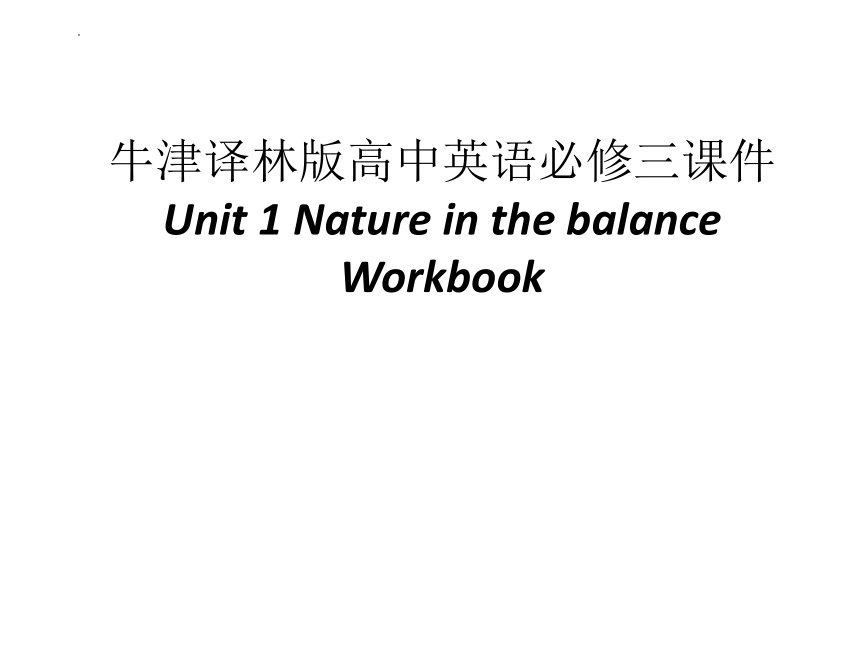 | |
| 格式 | pptx | ||
| 文件大小 | 294.8KB | ||
| 资源类型 | 教案 | ||
| 版本资源 | 牛津译林版(2019) | ||
| 科目 | 英语 | ||
| 更新时间 | 2023-08-14 11:02:30 | ||
图片预览

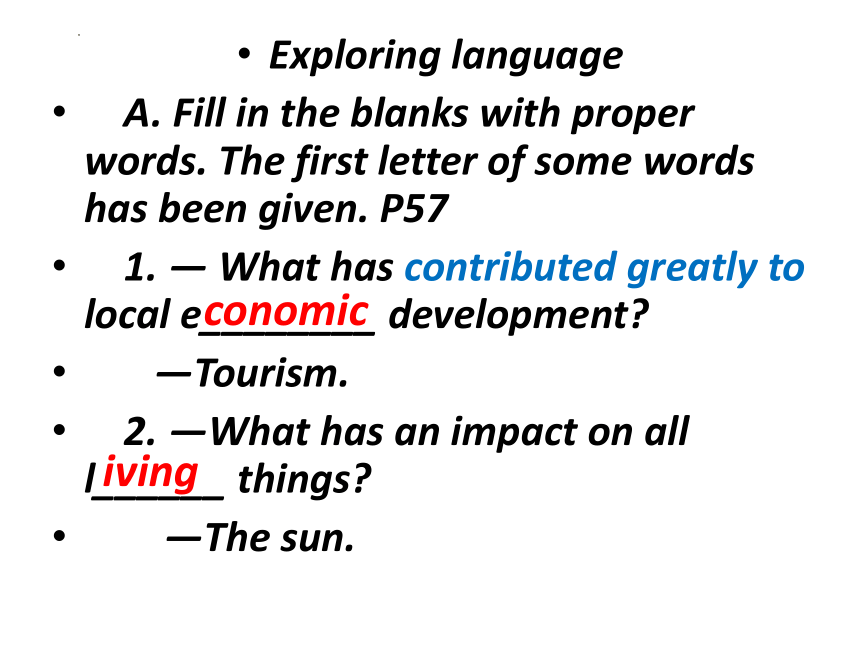
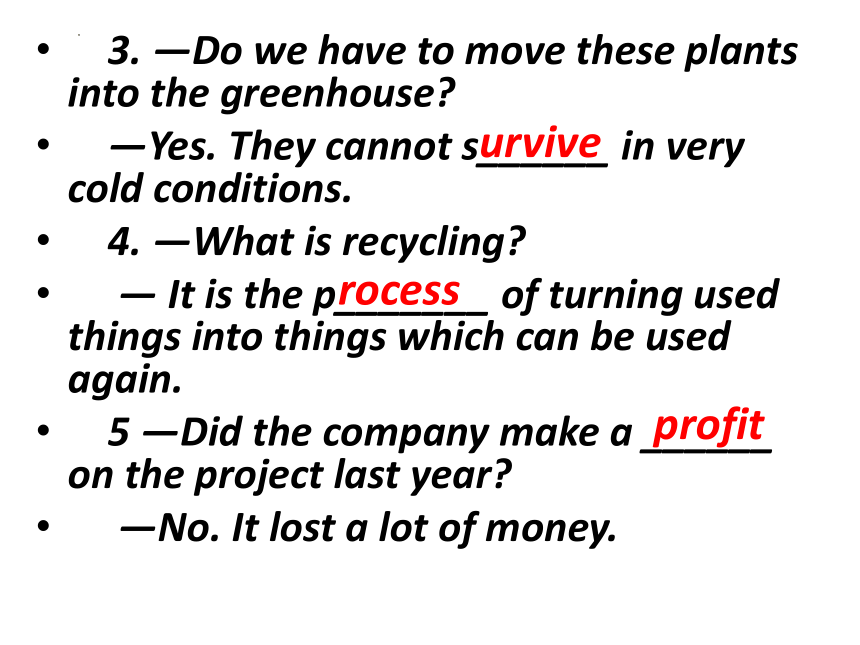
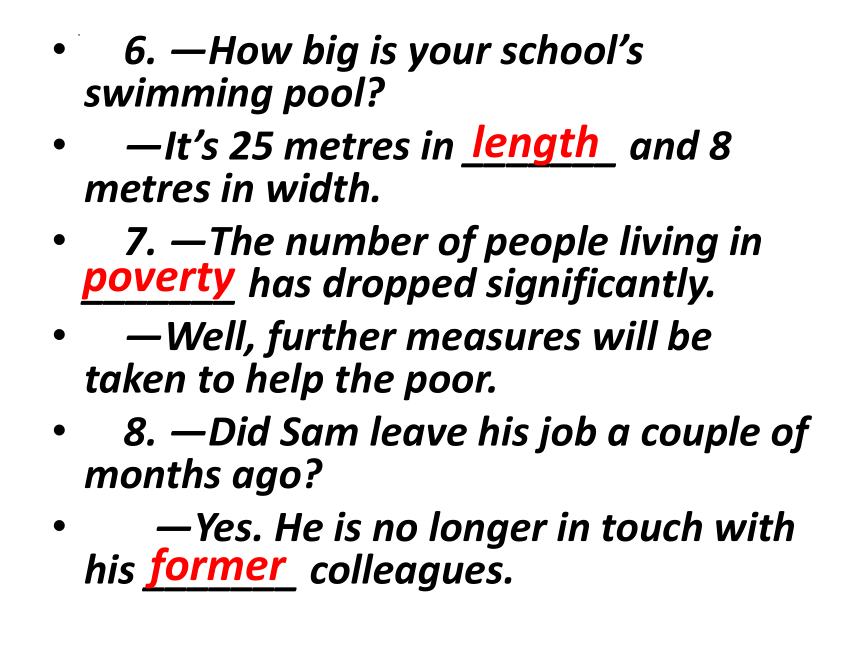
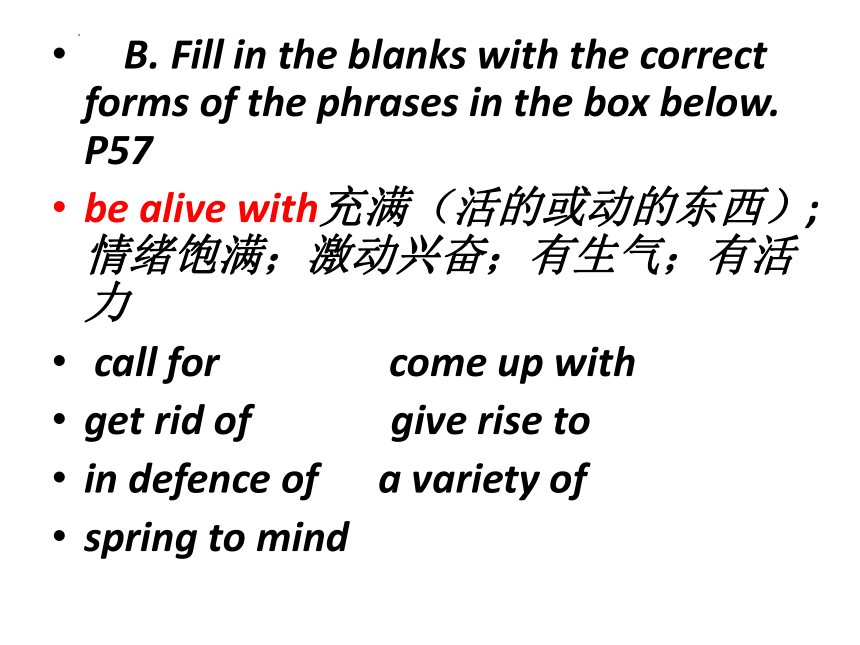
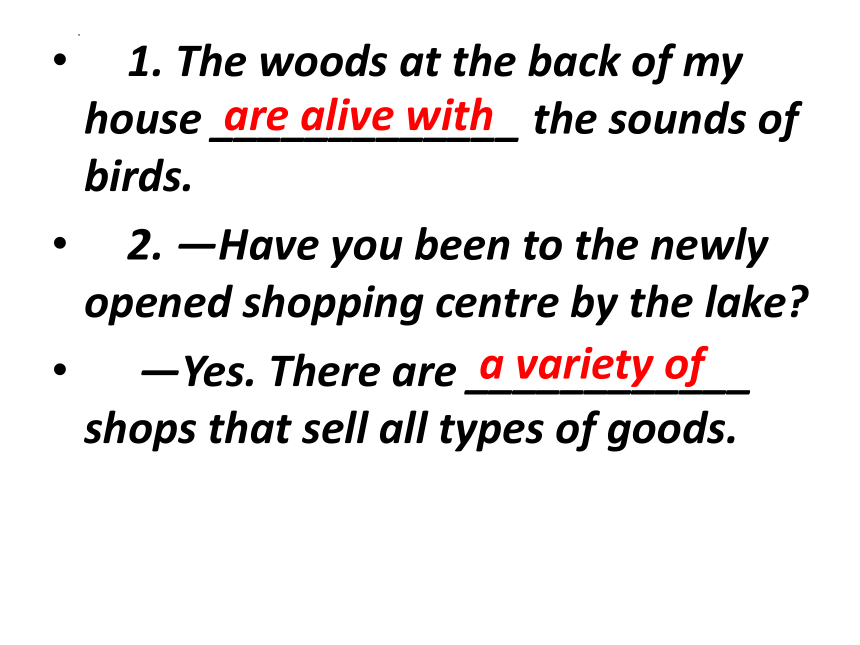
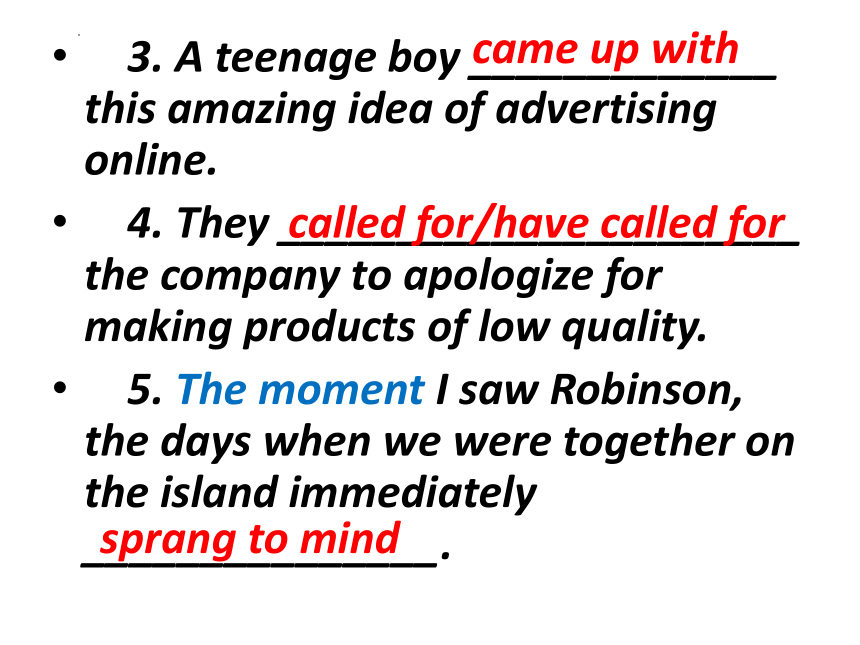
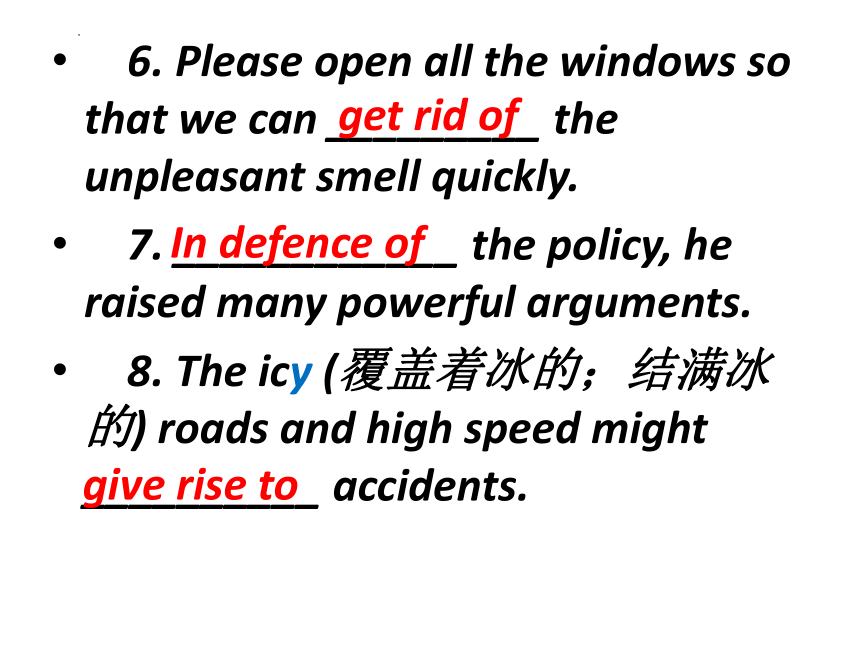
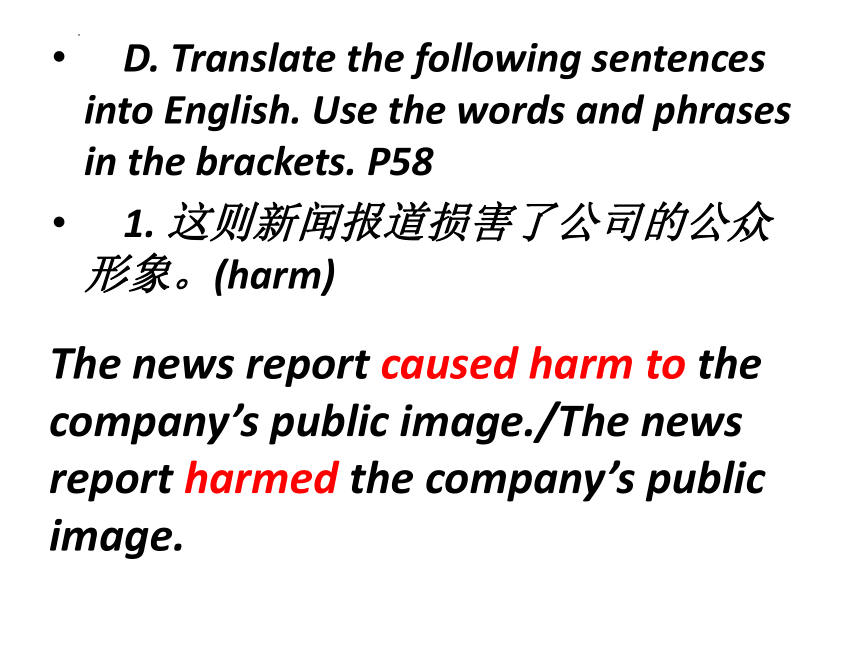
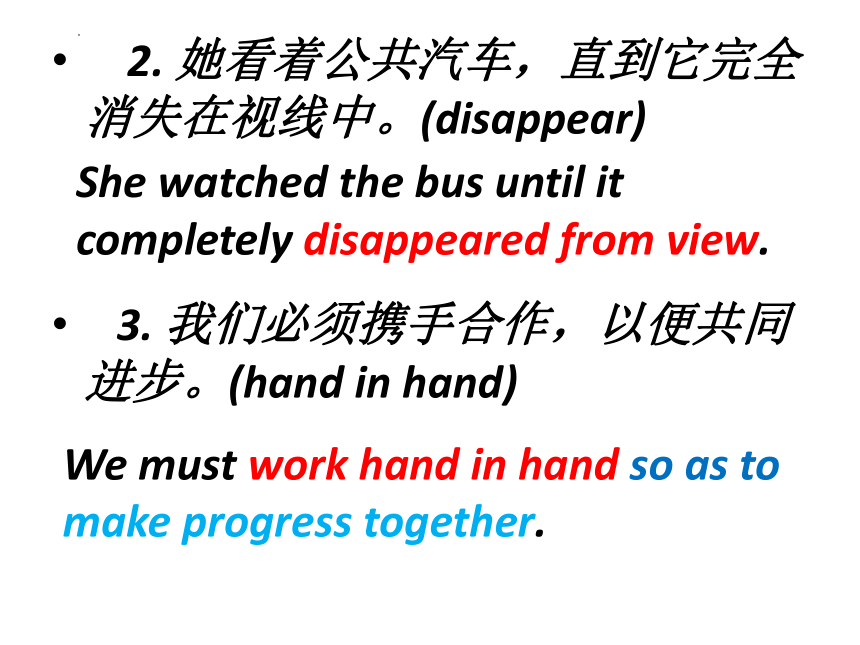
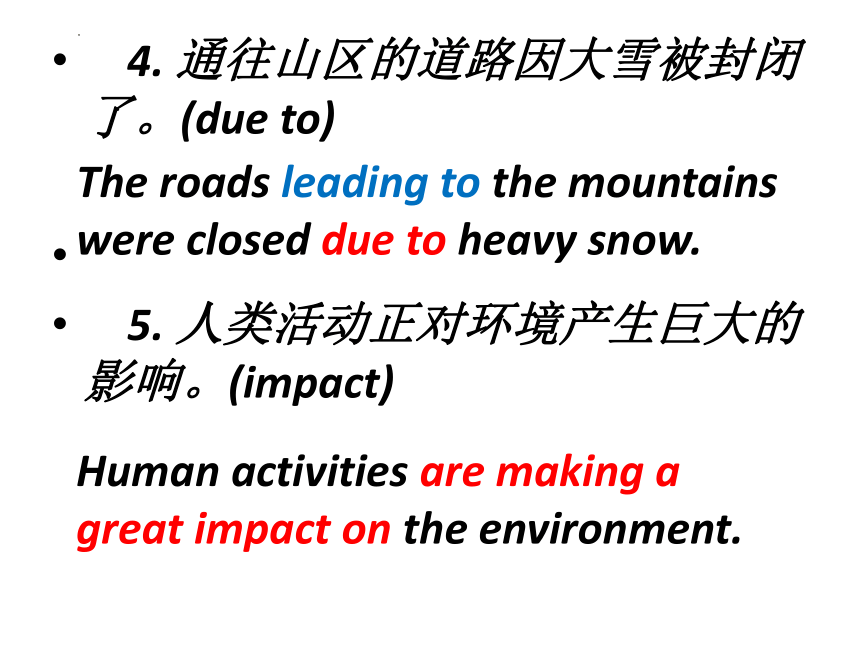
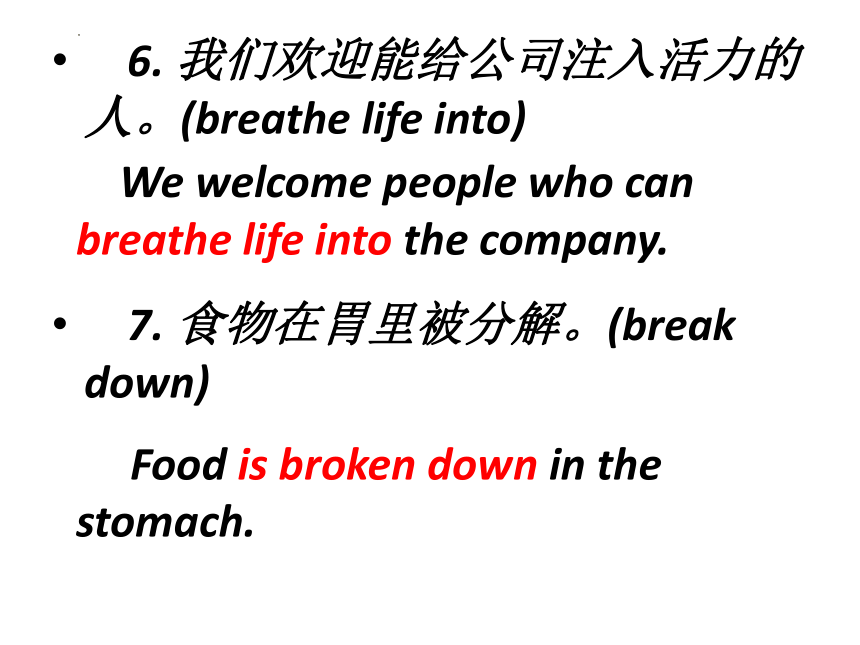
文档简介
(共57张PPT)
牛津译林版高中英语必修三课件
Unit 1 Nature in the balance
Workbook
Exploring language
A. Fill in the blanks with proper words. The first letter of some words has been given. P57
1. — What has contributed greatly to local e________ development
—Tourism.
2. —What has an impact on all l______ things
—The sun.
conomic
iving
3. —Do we have to move these plants into the greenhouse
—Yes. They cannot s______ in very cold conditions.
4. —What is recycling
— It is the p_______ of turning used things into things which can be used again.
5 —Did the company make a ______ on the project last year
—No. It lost a lot of money.
urvive
rocess
profit
6. —How big is your school’s swimming pool
—It’s 25 metres in _______ and 8 metres in width.
7. —The number of people living in _______ has dropped significantly.
—Well, further measures will be taken to help the poor.
8. —Did Sam leave his job a couple of months ago
—Yes. He is no longer in touch with his _______ colleagues.
length
poverty
former
B. Fill in the blanks with the correct forms of the phrases in the box below. P57
be alive with充满(活的或动的东西);情绪饱满;激动兴奋;有生气;有活力
call for come up with
get rid of give rise to
in defence of a variety of
spring to mind
1. The woods at the back of my house _____________ the sounds of birds.
2. —Have you been to the newly opened shopping centre by the lake
—Yes. There are ____________ shops that sell all types of goods.
are alive with
a variety of
3. A teenage boy _____________ this amazing idea of advertising online.
4. They ______________________ the company to apologize for making products of low quality.
5. The moment I saw Robinson, the days when we were together on the island immediately _______________.
came up with
called for/have called for
sprang to mind
6. Please open all the windows so that we can _________ the unpleasant smell quickly.
7. ____________ the policy, he raised many powerful arguments.
8. The icy (覆盖着冰的;结满冰的) roads and high speed might __________ accidents.
get rid of
In defence of
give rise to
D. Translate the following sentences into English. Use the words and phrases in the brackets. P58
1. 这则新闻报道损害了公司的公众形象。(harm)
The news report caused harm to the company’s public image./The news report harmed the company’s public image.
2. 她看着公共汽车,直到它完全消失在视线中。(disappear)
3. 我们必须携手合作,以便共同进步。(hand in hand)
She watched the bus until it completely disappeared from view.
We must work hand in hand so as to make progress together.
4. 通往山区的道路因大雪被封闭了。(due to)
5. 人类活动正对环境产生巨大的影响。(impact)
The roads leading to the mountains were closed due to heavy snow.
Human activities are making a great impact on the environment.
6. 我们欢迎能给公司注入活力的人。(breathe life into)
7. 食物在胃里被分解。(break down)
We welcome people who can breathe life into the company.
Food is broken down in the stomach.
8. 许多动物因为全球变暖有灭绝的危险。(in danger of)
Many animals are in danger of extinction because of global warming.
Building skills
A. Reading and speaking
A1. Have you thought that there could be a connection between swimming and protecting the environment Read the magazine article about a man swimming for clean water and answer the questions below.
Swimming for clean water
Martin Strel knows a thing or two about rivers. He has been swimming in them since he was a young boy. Although he holds five world records in marathon swimming, he is best known for using his sport to raise awareness of water pollution. After years of swimming in dirty water, he decided he had to do something.
Strel says he began to swim to promote “peace, friendship and clean waters [(某一江、河、湖、海的)水域]”. He hopes to see environmental laws strengthened and strictly enforced.
As part of his quest[探索,寻找,追求(幸福等)], he has swum in many of the world’s most famous rivers. In 2000, he conquered Europe’s second longest river, the Danube [ d nju:b](多瑙河).
He swam 1,866 miles (3,003 km) in 58 days and set a world record for long-distance swimming. The Danube is heavily polluted from sewage [ su d ] [(下水道的)污水,污物] and years of unregulated(未受控制的,无管理的;未经调节的,未校准的) industrial waste.
In 2002, Strel swam in the Mississippi [ m s s pi] River and covered a distance of 2,360 miles (3,798 km) in 68 days.
The Mississippi is one of the most polluted rivers in the United States, and millions of pounds of poisonous chemicals enter the river each year. Its mouth( 入海口;河口) leads into the Gulf of Mexico [ m ks k ] and is so polluted that it is called the dead zone[死水区(因缺氧而使动物无法生存);空白地带,空白期(没有事情发生);隔离带;盲区,静区(无手机信号)].
This zone covers more than 6,000 square miles (15,500 square km), and is devoid [d v d](完全没有;缺乏) of oxygen and marine life. Strel became so sick by the end of his Mississippi swim that he had to be hospitalized ['hɑsp tl,a z] [送(某人)入院治疗] for three days.
In 2007, he swam 3,274 miles (5,269 km) of the Amazon [ m z n] River in 66 days.
Most of the pollution in the Amazon comes from mercury [ m kj ri](汞;水银) used in gold mining(金矿) and oil leaks[泄漏出的液体(或气体)] from poorly maintained boats. He lost 42 pounds and was so weak that he couldn’t feed himself and had to be carried in and out of the water.
Strel plans to keep on swimming for peace, friendship and clean water, but he would prefer to do it in the ocean. Sadly(令人遗憾;不幸地), the world’s rivers are simply [(强调某说法)确实,简直] too dirty. “Everyone would like to go swimming in clean water,” says Strel. He dreams of a day when that will be possible for people around the world.
1. What does the underlined phrase “is devoid of” in the third paragraph mean
2. What were Strel’s swimming experiences in the three rivers like
The phrase “is devoid of” means a complete lack of something.
In 2000, Strel swam in the Danube, Europe’s second longest river. He covered a distance of 1,866 miles (3,003 km) in 58 days. In 2002, he swam in the Mississippi River for 2,360 miles (3,798 km) in 68 days. He became very sick and stayed in hospital for three days after he finished swimming. In 2007, he swam in the Amazon River for a distance of 3,274 miles (5,269 km) in 66 days. He became very weak and had to be carried in and out of the water.
A2. Martin Strel tries to raise environmental awareness at the price of his own health. In pairs, discuss what you think of Strel’s actions. Use the example below to help you and pay attention to the expressions in red. P60
A: I think Martin Strel is doing the right thing.
B: I disagree. What he’s doing is very dangerous. He’s only harming himself. In the end, his actions won’t have any effect on pollution.
A: But don’t you think that pollution is a serious issue The problem is that people aren’t doing enough about it. Strel is doing a lot to raise awareness.
B: I agree that pollution is a serious issue, but there are other ways of raising awareness—for instance, he could travel to different cities and give lectures about it instead.
A: I don’t think newspaper journalists would pay any attention to him— there are already so many people giving lectures. But now newspapers around the world are writing about him and people are talking about him—isn’t that proof that he’s been successful
B. Listening and writing
B1. Justin is listening to his teacher talking about desertification(沙漠化) [d z t f ke n]. Listen to the lecture and answer the questions below.
1. What happens when farmers farm(耕种;在…上从事畜牧业) their land too much
The soil has no chance to recover.
2. What happens to the soil when trees are cut down
3. What effect has climate change had on the land
It blows away in the wind or washes away in floods.
It has dried out[(使)变干,干透] a lot of land.
4. What happens to people’s way of living when farmland turns into desert
5. What percentage of the human population is directly affected by desertification
People can no longer grow food or raise animals on the land.
More than 25 per cent.
Tapescript
Teacher: One of the world’s biggest environmental problems is desertification. Desertification is the process during which farmland turns into desert. It’s happening all over the world and it’s happening very quickly.
There are several causes of desertification. Some farmers farm their land too much, without giving the soil a chance to recover. Others allow their animals to eat up large areas of grass far too quickly—at a rate that makes it impossible for the grass to grow back. Cutting down trees is another major cause of desertification. Trees help protect the soil.
eat up | eat sth up
A. 吃完;吃光
Eat up! We've got to go out soon.
都吃光!我们得马上出去。
Come on. Eat up your potatoes.
快点儿。把土豆都吃掉。
B.(大量地)耗费,花费,损耗
Legal costs had eaten up all the savings she had.诉讼费耗掉了她所有的积蓄。
eat sb up[常用被动态] (情感)使沉迷,使焦虑,使纠缠
She was eaten up by regrets.她后悔不已。
cut sth down(自根基部分)砍倒
cut sth down (to…) | cut down (on sth) 削减,缩小(尺寸、数量或数目)
We need to cut the article down to 1 000 words.
我们得把这篇文章压缩到1 000 字。
The doctor told him to cut down on his drinking.医生劝他少喝酒。
Without trees, the soil easily blows away in the wind or washes away in floods. Moreover, some parts of the Earth are hotter today than they used to be. This change in climate has dried out a lot of land.
The consequences of desertification can be disastrous [d zɑ str s](极糟糕的;灾难性的;完全失败的).
When farmland turns into desert, people can no longer grow food or raise animals on the land. With roughly 2 billion people living in or near deserts, this problem directly affects more than 25 per cent of the human population.
B2. Justin and Amy are discussing their research on China’s efforts to solve the problem of desertification. Listen to the conversation and complete the notes below. P61
1978
More than 60
stop animals
how quickly
1995
use water responsibly
Tapescript
Justin: Hi Amy, how’s your research on desertification going
Amy: Not bad. I learn that China has already taken a lot of steps to address (设法解决;处理;对付) the problem. One thing the government has done is to build a “Green Great Wall”. It’s a long stretch(一片;一泓;一段) of trees and bushes at the border of the Gobi Desert.
They started this project in 1978 and have already planted more than 60 billion trees. The project will be completed in 2050. By then, the wall will be 4,500 kilometres long!
Justin: Wow! That’s amazing.
Amy: I also learn that the government has experimented with (尝试;试用) other ways to stop desertification.
For example, they built large fences to stop animals from eating certain plants. This gives the plants time to grow. How is your research
Justin: From my own research, I learn that the government has also set up a monitoring centre to keep track of how quickly deserts are growing.
Many scientists at this centre, which was opened in 1995, are working to find creative new ways to solve the problem. Did you know the Gobi Desert is one of the fastest growing deserts on the planet
Amy: Really We need to do something to stop this.
Justin: Exactly. I also read about how important education is when it comes to solving environmental problems. People need to learn how to use water responsibly.
B3. Desertification is a serious environmental problem around the world. Write an article about desertification.
Desertification
Desertification, as the name suggests, happens when non-desert areas slowly become deserts.
Desertification can be caused by several factors, such as global warming, overpopulation(人口过密) and droughts.
If people use the wrong farming methods or cut down too many trees, farmland can turn into desert. △ With about two billion people directly affected, desertification has become growing concern for many countries.
We need to take steps to prevent desertification. We should pay attention to how much energy we use in our daily lives.
That way, we can reduce the amount of carbon dioxide released. We can walk or cycle short distances, and use less water. We can also protect our forests by reusing paper and not using disposable (用后即丢弃的;一次性的) [d sp z bl] chopsticks. What’s more, we should try to make people around us aware of the problem and encourage them to change their daily habits in the same way.
Appreciating language
There has been growing concern about the use of chemicals and its damage to the environment. Read aloud the excerpt below about such environmental problems.
A fable(寓言) for tomorrow
THERE WAS ONCE a town in the heart of America where all life seemed to live in harmony with its surroundings. The town was surrounded by prosperous(繁荣的;成功的;兴旺的) farms, with fields of grain and hillsides of orchards[ :t dz] (果园) where, in spring, white clouds drifted above the green fields.
Along the roads, beautiful trees delighted the traveler’s eye(赏心悦目) through much of the year. Even in winter the roadsides were places of beauty, where countless birds came to feed on the berries(浆果;莓). The countryside was, in fact, famous for its rich bird life(鸟类), and people traveled from great distances to observe them.
Others came to fish[在…捕鱼(或钓鱼)] the streams, which flowed clear and cold out of the hills. So it had been from the days many years ago when the first settlers raised their houses, sank[挖,掘(深坑、深洞)] their wells, and built their barns(谷仓;畜棚).
Then everything began to change: mysterious illnesses swept the flocks of chickens; the cattle and sheep sickened and died. Everywhere was a shadow of death.
There was a strange silence. The birds, for example—where had they gone Many people spoke of them, puzzled and disturbed(心神不安的;心烦意乱的;烦恼的). The few birds seen anywhere were unhealthy; they were shaking violently(猛烈地;厉害地) and could not fly. It was a spring without voices. On the mornings that had once been alive with birdsong, there was now no sound; only silence lay over the fields and woods.只有寂静笼罩着田野和树林。
lie(光、云、雾等)存在,展现
It had been wet overnight, and a morning mist lay on the field.
前一天晚上下了雨,田野上笼着一层晨雾。
The roadsides, once so attractive, were now lined with [沿…形成行(或列、排)] browned and withered(干枯的;枯萎的) plants(枯黄的植物) as though swept by fire. These, too, were silent, deserted by all living things. Even the streams were now lifeless. People no longer visited them, for all the fish had died.
No black magic(魔法;妖术;巫术), no enemy action had silenced[制止,使不再发表(反对意见) ] the rebirth of new life in this stricken(受煎熬的;患病的;遭受挫折的;受灾的) world. The people had done it themselves.
This town does not actually exist, and I know of no community that has experienced all the things I describe. Yet every one of these disasters has actually happened somewhere.
A dangerous threat has crept upon [(尤指不知不觉地)开始影响(某人)] us almost unnoticed, and this imagined tragedy may easily become a terrible reality we all shall know.
(Adapted from Silent Spring,
by Rachel Carson)
Guided reading
Rachel Carson (1907-1964) was an American marine biologist, author and conservationist. She is best known for the 1962 book Silent Spring which sparked(引发;触发) the modern environmental movement. The book draws attention to sudden illness and death in animal populations that turned out(原来是;证明是;结果是) to be caused by the misuse of chemical pesticides such as DDT.
This is an adapted excerpt from the first chapter. Instead of simply stating dry facts(基本事实), Carson introduces the topic with what seems to be a fable or a fairy tale[童话(故事)] :“THERE WAS ONCE a town in the heart of America where all life seemed to live in harmony with its surroundings.” She continues with simple descriptions of the idyllic [ d l k](安恬的;田园诗般的;质朴宜人的) environment outside the town.
The use of the past tense evokes[引起,唤起(感情、记忆或形象)] the imagined “good old days”, but also hints(暗示;透露;示意) that something is about to change. Without warning, she introduces the horrible situation that the local people are suddenly faced with. By using a fictional(虚构的) town, she is able to sum up(总结;概括) a complex set of problems with a simple generalization (概括;归纳;泛论).
This technique also allows her to grab(引人注意;吸引) the reader’s attention and generate(造成;引起;导致) a strong emotional response to raise public awareness of the threats of environmental pollution.
牛津译林版高中英语必修三课件
Unit 1 Nature in the balance
Workbook
Exploring language
A. Fill in the blanks with proper words. The first letter of some words has been given. P57
1. — What has contributed greatly to local e________ development
—Tourism.
2. —What has an impact on all l______ things
—The sun.
conomic
iving
3. —Do we have to move these plants into the greenhouse
—Yes. They cannot s______ in very cold conditions.
4. —What is recycling
— It is the p_______ of turning used things into things which can be used again.
5 —Did the company make a ______ on the project last year
—No. It lost a lot of money.
urvive
rocess
profit
6. —How big is your school’s swimming pool
—It’s 25 metres in _______ and 8 metres in width.
7. —The number of people living in _______ has dropped significantly.
—Well, further measures will be taken to help the poor.
8. —Did Sam leave his job a couple of months ago
—Yes. He is no longer in touch with his _______ colleagues.
length
poverty
former
B. Fill in the blanks with the correct forms of the phrases in the box below. P57
be alive with充满(活的或动的东西);情绪饱满;激动兴奋;有生气;有活力
call for come up with
get rid of give rise to
in defence of a variety of
spring to mind
1. The woods at the back of my house _____________ the sounds of birds.
2. —Have you been to the newly opened shopping centre by the lake
—Yes. There are ____________ shops that sell all types of goods.
are alive with
a variety of
3. A teenage boy _____________ this amazing idea of advertising online.
4. They ______________________ the company to apologize for making products of low quality.
5. The moment I saw Robinson, the days when we were together on the island immediately _______________.
came up with
called for/have called for
sprang to mind
6. Please open all the windows so that we can _________ the unpleasant smell quickly.
7. ____________ the policy, he raised many powerful arguments.
8. The icy (覆盖着冰的;结满冰的) roads and high speed might __________ accidents.
get rid of
In defence of
give rise to
D. Translate the following sentences into English. Use the words and phrases in the brackets. P58
1. 这则新闻报道损害了公司的公众形象。(harm)
The news report caused harm to the company’s public image./The news report harmed the company’s public image.
2. 她看着公共汽车,直到它完全消失在视线中。(disappear)
3. 我们必须携手合作,以便共同进步。(hand in hand)
She watched the bus until it completely disappeared from view.
We must work hand in hand so as to make progress together.
4. 通往山区的道路因大雪被封闭了。(due to)
5. 人类活动正对环境产生巨大的影响。(impact)
The roads leading to the mountains were closed due to heavy snow.
Human activities are making a great impact on the environment.
6. 我们欢迎能给公司注入活力的人。(breathe life into)
7. 食物在胃里被分解。(break down)
We welcome people who can breathe life into the company.
Food is broken down in the stomach.
8. 许多动物因为全球变暖有灭绝的危险。(in danger of)
Many animals are in danger of extinction because of global warming.
Building skills
A. Reading and speaking
A1. Have you thought that there could be a connection between swimming and protecting the environment Read the magazine article about a man swimming for clean water and answer the questions below.
Swimming for clean water
Martin Strel knows a thing or two about rivers. He has been swimming in them since he was a young boy. Although he holds five world records in marathon swimming, he is best known for using his sport to raise awareness of water pollution. After years of swimming in dirty water, he decided he had to do something.
Strel says he began to swim to promote “peace, friendship and clean waters [(某一江、河、湖、海的)水域]”. He hopes to see environmental laws strengthened and strictly enforced.
As part of his quest[探索,寻找,追求(幸福等)], he has swum in many of the world’s most famous rivers. In 2000, he conquered Europe’s second longest river, the Danube [ d nju:b](多瑙河).
He swam 1,866 miles (3,003 km) in 58 days and set a world record for long-distance swimming. The Danube is heavily polluted from sewage [ su d ] [(下水道的)污水,污物] and years of unregulated(未受控制的,无管理的;未经调节的,未校准的) industrial waste.
In 2002, Strel swam in the Mississippi [ m s s pi] River and covered a distance of 2,360 miles (3,798 km) in 68 days.
The Mississippi is one of the most polluted rivers in the United States, and millions of pounds of poisonous chemicals enter the river each year. Its mouth( 入海口;河口) leads into the Gulf of Mexico [ m ks k ] and is so polluted that it is called the dead zone[死水区(因缺氧而使动物无法生存);空白地带,空白期(没有事情发生);隔离带;盲区,静区(无手机信号)].
This zone covers more than 6,000 square miles (15,500 square km), and is devoid [d v d](完全没有;缺乏) of oxygen and marine life. Strel became so sick by the end of his Mississippi swim that he had to be hospitalized ['hɑsp tl,a z] [送(某人)入院治疗] for three days.
In 2007, he swam 3,274 miles (5,269 km) of the Amazon [ m z n] River in 66 days.
Most of the pollution in the Amazon comes from mercury [ m kj ri](汞;水银) used in gold mining(金矿) and oil leaks[泄漏出的液体(或气体)] from poorly maintained boats. He lost 42 pounds and was so weak that he couldn’t feed himself and had to be carried in and out of the water.
Strel plans to keep on swimming for peace, friendship and clean water, but he would prefer to do it in the ocean. Sadly(令人遗憾;不幸地), the world’s rivers are simply [(强调某说法)确实,简直] too dirty. “Everyone would like to go swimming in clean water,” says Strel. He dreams of a day when that will be possible for people around the world.
1. What does the underlined phrase “is devoid of” in the third paragraph mean
2. What were Strel’s swimming experiences in the three rivers like
The phrase “is devoid of” means a complete lack of something.
In 2000, Strel swam in the Danube, Europe’s second longest river. He covered a distance of 1,866 miles (3,003 km) in 58 days. In 2002, he swam in the Mississippi River for 2,360 miles (3,798 km) in 68 days. He became very sick and stayed in hospital for three days after he finished swimming. In 2007, he swam in the Amazon River for a distance of 3,274 miles (5,269 km) in 66 days. He became very weak and had to be carried in and out of the water.
A2. Martin Strel tries to raise environmental awareness at the price of his own health. In pairs, discuss what you think of Strel’s actions. Use the example below to help you and pay attention to the expressions in red. P60
A: I think Martin Strel is doing the right thing.
B: I disagree. What he’s doing is very dangerous. He’s only harming himself. In the end, his actions won’t have any effect on pollution.
A: But don’t you think that pollution is a serious issue The problem is that people aren’t doing enough about it. Strel is doing a lot to raise awareness.
B: I agree that pollution is a serious issue, but there are other ways of raising awareness—for instance, he could travel to different cities and give lectures about it instead.
A: I don’t think newspaper journalists would pay any attention to him— there are already so many people giving lectures. But now newspapers around the world are writing about him and people are talking about him—isn’t that proof that he’s been successful
B. Listening and writing
B1. Justin is listening to his teacher talking about desertification(沙漠化) [d z t f ke n]. Listen to the lecture and answer the questions below.
1. What happens when farmers farm(耕种;在…上从事畜牧业) their land too much
The soil has no chance to recover.
2. What happens to the soil when trees are cut down
3. What effect has climate change had on the land
It blows away in the wind or washes away in floods.
It has dried out[(使)变干,干透] a lot of land.
4. What happens to people’s way of living when farmland turns into desert
5. What percentage of the human population is directly affected by desertification
People can no longer grow food or raise animals on the land.
More than 25 per cent.
Tapescript
Teacher: One of the world’s biggest environmental problems is desertification. Desertification is the process during which farmland turns into desert. It’s happening all over the world and it’s happening very quickly.
There are several causes of desertification. Some farmers farm their land too much, without giving the soil a chance to recover. Others allow their animals to eat up large areas of grass far too quickly—at a rate that makes it impossible for the grass to grow back. Cutting down trees is another major cause of desertification. Trees help protect the soil.
eat up | eat sth up
A. 吃完;吃光
Eat up! We've got to go out soon.
都吃光!我们得马上出去。
Come on. Eat up your potatoes.
快点儿。把土豆都吃掉。
B.(大量地)耗费,花费,损耗
Legal costs had eaten up all the savings she had.诉讼费耗掉了她所有的积蓄。
eat sb up[常用被动态] (情感)使沉迷,使焦虑,使纠缠
She was eaten up by regrets.她后悔不已。
cut sth down(自根基部分)砍倒
cut sth down (to…) | cut down (on sth) 削减,缩小(尺寸、数量或数目)
We need to cut the article down to 1 000 words.
我们得把这篇文章压缩到1 000 字。
The doctor told him to cut down on his drinking.医生劝他少喝酒。
Without trees, the soil easily blows away in the wind or washes away in floods. Moreover, some parts of the Earth are hotter today than they used to be. This change in climate has dried out a lot of land.
The consequences of desertification can be disastrous [d zɑ str s](极糟糕的;灾难性的;完全失败的).
When farmland turns into desert, people can no longer grow food or raise animals on the land. With roughly 2 billion people living in or near deserts, this problem directly affects more than 25 per cent of the human population.
B2. Justin and Amy are discussing their research on China’s efforts to solve the problem of desertification. Listen to the conversation and complete the notes below. P61
1978
More than 60
stop animals
how quickly
1995
use water responsibly
Tapescript
Justin: Hi Amy, how’s your research on desertification going
Amy: Not bad. I learn that China has already taken a lot of steps to address (设法解决;处理;对付) the problem. One thing the government has done is to build a “Green Great Wall”. It’s a long stretch(一片;一泓;一段) of trees and bushes at the border of the Gobi Desert.
They started this project in 1978 and have already planted more than 60 billion trees. The project will be completed in 2050. By then, the wall will be 4,500 kilometres long!
Justin: Wow! That’s amazing.
Amy: I also learn that the government has experimented with (尝试;试用) other ways to stop desertification.
For example, they built large fences to stop animals from eating certain plants. This gives the plants time to grow. How is your research
Justin: From my own research, I learn that the government has also set up a monitoring centre to keep track of how quickly deserts are growing.
Many scientists at this centre, which was opened in 1995, are working to find creative new ways to solve the problem. Did you know the Gobi Desert is one of the fastest growing deserts on the planet
Amy: Really We need to do something to stop this.
Justin: Exactly. I also read about how important education is when it comes to solving environmental problems. People need to learn how to use water responsibly.
B3. Desertification is a serious environmental problem around the world. Write an article about desertification.
Desertification
Desertification, as the name suggests, happens when non-desert areas slowly become deserts.
Desertification can be caused by several factors, such as global warming, overpopulation(人口过密) and droughts.
If people use the wrong farming methods or cut down too many trees, farmland can turn into desert. △ With about two billion people directly affected, desertification has become growing concern for many countries.
We need to take steps to prevent desertification. We should pay attention to how much energy we use in our daily lives.
That way, we can reduce the amount of carbon dioxide released. We can walk or cycle short distances, and use less water. We can also protect our forests by reusing paper and not using disposable (用后即丢弃的;一次性的) [d sp z bl] chopsticks. What’s more, we should try to make people around us aware of the problem and encourage them to change their daily habits in the same way.
Appreciating language
There has been growing concern about the use of chemicals and its damage to the environment. Read aloud the excerpt below about such environmental problems.
A fable(寓言) for tomorrow
THERE WAS ONCE a town in the heart of America where all life seemed to live in harmony with its surroundings. The town was surrounded by prosperous(繁荣的;成功的;兴旺的) farms, with fields of grain and hillsides of orchards[ :t dz] (果园) where, in spring, white clouds drifted above the green fields.
Along the roads, beautiful trees delighted the traveler’s eye(赏心悦目) through much of the year. Even in winter the roadsides were places of beauty, where countless birds came to feed on the berries(浆果;莓). The countryside was, in fact, famous for its rich bird life(鸟类), and people traveled from great distances to observe them.
Others came to fish[在…捕鱼(或钓鱼)] the streams, which flowed clear and cold out of the hills. So it had been from the days many years ago when the first settlers raised their houses, sank[挖,掘(深坑、深洞)] their wells, and built their barns(谷仓;畜棚).
Then everything began to change: mysterious illnesses swept the flocks of chickens; the cattle and sheep sickened and died. Everywhere was a shadow of death.
There was a strange silence. The birds, for example—where had they gone Many people spoke of them, puzzled and disturbed(心神不安的;心烦意乱的;烦恼的). The few birds seen anywhere were unhealthy; they were shaking violently(猛烈地;厉害地) and could not fly. It was a spring without voices. On the mornings that had once been alive with birdsong, there was now no sound; only silence lay over the fields and woods.只有寂静笼罩着田野和树林。
lie(光、云、雾等)存在,展现
It had been wet overnight, and a morning mist lay on the field.
前一天晚上下了雨,田野上笼着一层晨雾。
The roadsides, once so attractive, were now lined with [沿…形成行(或列、排)] browned and withered(干枯的;枯萎的) plants(枯黄的植物) as though swept by fire. These, too, were silent, deserted by all living things. Even the streams were now lifeless. People no longer visited them, for all the fish had died.
No black magic(魔法;妖术;巫术), no enemy action had silenced[制止,使不再发表(反对意见) ] the rebirth of new life in this stricken(受煎熬的;患病的;遭受挫折的;受灾的) world. The people had done it themselves.
This town does not actually exist, and I know of no community that has experienced all the things I describe. Yet every one of these disasters has actually happened somewhere.
A dangerous threat has crept upon [(尤指不知不觉地)开始影响(某人)] us almost unnoticed, and this imagined tragedy may easily become a terrible reality we all shall know.
(Adapted from Silent Spring,
by Rachel Carson)
Guided reading
Rachel Carson (1907-1964) was an American marine biologist, author and conservationist. She is best known for the 1962 book Silent Spring which sparked(引发;触发) the modern environmental movement. The book draws attention to sudden illness and death in animal populations that turned out(原来是;证明是;结果是) to be caused by the misuse of chemical pesticides such as DDT.
This is an adapted excerpt from the first chapter. Instead of simply stating dry facts(基本事实), Carson introduces the topic with what seems to be a fable or a fairy tale[童话(故事)] :“THERE WAS ONCE a town in the heart of America where all life seemed to live in harmony with its surroundings.” She continues with simple descriptions of the idyllic [ d l k](安恬的;田园诗般的;质朴宜人的) environment outside the town.
The use of the past tense evokes[引起,唤起(感情、记忆或形象)] the imagined “good old days”, but also hints(暗示;透露;示意) that something is about to change. Without warning, she introduces the horrible situation that the local people are suddenly faced with. By using a fictional(虚构的) town, she is able to sum up(总结;概括) a complex set of problems with a simple generalization (概括;归纳;泛论).
This technique also allows her to grab(引人注意;吸引) the reader’s attention and generate(造成;引起;导致) a strong emotional response to raise public awareness of the threats of environmental pollution.
同课章节目录
- Unit 1 Nature in the balance
- Welcome to the unit
- Reading
- Grammar and usage
- Integrated skills
- Extended reading
- Project
- Unit 2 Natural disasters
- Welcome to the unit
- Reading
- Grammar and usage
- Integrated skills
- Extended reading
- Project
- Unit 3 The world online
- Welcome to the unit
- Reading
- Grammar and usage
- Integrated skills
- Extended reading
- Project
- Unit 4 Scientists who changed the world
- Welcome to the unit
- Reading
- Grammar and usage
- Integrated skills
- Extended reading
- Project
